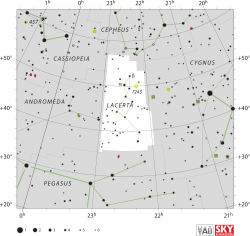|
| 6 Lacertae |  | Observationsdata
Epok: J2000.0 |
|---|
| Stjärnbild | Ödlan |
|---|
| Rektascension | 22t 30m 29,26005s[1] |
|---|
| Deklination | +43° 07′ 24,1565″[1] |
|---|
Skenbar magnitud ( ) ) | 4,52 (V),[2] 4,511 ± 0,009 (V)[3] |
|---|
| Stjärntyp |
|---|
| Spektraltyp | B2 IV[4] |
|---|
| B–V | -0,086± 0,018[5] |
|---|
| Astrometri |
|---|
Radialhastighet ( ) ) | -8,70 ± 0,9[2] km/s |
|---|
| Egenrörelse (µ) | RA: -4,80[1] mas/år
Dek.: -2,598[1] mas/år |
|---|
Parallax ( ) ) | 1,7577 ± 0,2697[1] |
|---|
| Avstånd | ca 1 900 lå (ca 570 pc) |
|---|
Absolut magnitud ( ) ) | -2,62[6] |
|---|
| Detaljer |
|---|
| Massa | 12,5 ± 0,6[7] M☉ |
|---|
| Radie | 6,9[8] R☉ |
|---|
| Luminositet | 34 590[9] L☉ |
|---|
| Temperatur | 21 150[9] K |
|---|
| Metallicitet | -0,04 (Fe/H)[10] dex |
|---|
| Vinkelhastighet | 70[11] km/s |
|---|
| Ålder | 15,7 ± 0,1[7] miljoner år |
|---|
| Andra beteckningar |
|---|
| 2MASS J22302925+4307241[12], HD 213420[12], HIP 111104[12], SAO 52079[12], HR 8579[12], IRAS 22283+4251[12], GSC 03209-02260[12], BD+42 4420[12], FK5 3800[12], GC 31449[12], GCRV 14148[12], HIC 111104[12], JP11 3503[12], N30 4959[12], PPM 63038[12], ROT 3278[12], TD1 29140[12], TYC 3209-2260-1[12], UBV 19241[12], uvby98 100213420[12], SBC9 1378[12], HGAM 1069[12], SBC7 915[12], WEB 19891[12], Gaia DR2 1981881498752967552[12], 6 Lac, Gaia DR3 1981881498752967552[12], TIC 200157908[12], AG+42 2178[12], UBV M 26447[12] och ALS 16172[12][3][13] |
6 Lacertae, som är stjärnans Flamsteed-beteckning, är en dubbelstjärna[14] belägen i den mellersta delen av stjärnbilden Ödlan. Den har en kombinerad skenbar magnitud på ca 4,52[2] och är mycket svagt synlig för blotta ögat där ljusföroreningar ej förekommer. Baserat på parallax enligt Gaia Data Release 2 på ca 1,8[1] mas, beräknas den befinna sig på ett avstånd på ca 1 900 ljusår (ca 570 parsek) från solen. Den rör sig närmare solen med en heliocentrisk radialhastighet av ca -9 km/s.[2] Stjärnan misstänks ingå i stjärnföreningen Lacertae OB1.[6]
Egenskaper
Primärstjärnan 6 Lacertae A är en blå till vit underjättestjärna av spektralklass B2 IV.[4] Den har en massa som är ca 12,5[7] solmassor, en radie som är ca 7[8] solradier och utsänder ca 34 600[9] gånger mera energi än solen från dess fotosfär vid en effektiv temperatur av ca 21 200 K.[9]
6 Lacertae utgörs av en enkelsidig spektroskopisk dubbelstjärna med en omloppsperiod av 880 dygn och en excentricitet på 0,3.[14]
Referenser
- Den här artikeln är helt eller delvis baserad på material från engelskspråkiga Wikipedia, 4 Lacertae, 4 januari 2021.
Noter
- ^ [a b c d e f] Brown, A. G. A.; et al. (Gaia collaboration) (August 2018). "Gaia Data Release 2: Summary of the contents and survey properties". Astronomy & Astrophysics. 616. A1. arXiv:1804.09365. Bibcode:2018A&A...616A...1G. doi:10.1051/0004-6361/201833051. Gaia DR2 record for this source at VizieR.
- ^ [a b c d] Anderson, E.; Francis, Ch. (2012), "XHIP: An extended hipparcos compilation", Astronomy Letters, 38 (5): 331, arXiv:1108.4971, Bibcode:2012AstL...38..331A, doi:10.1134/S1063773712050015.
- ^ [a b] ”Basic data: V* 6 Lac – Spectroscopic binary” (på engelska). Centre de Données astronomiques de Strasbourg. http://simbad.u-strasbg.fr/simbad/sim-basic?Ident=6+Lac&submit=SIMBAD+search. Läst 11 augusti 2019.
- ^ [a b] Lesh, Janet Rountree (December 1968), "The Kinematics of the Gould Belt: an Expanding Group?", Astrophysical Journal Supplement, 17: 371, Bibcode:1968ApJS...17..371L, doi:10.1086/190179
- ^ van Leeuwen (2007). ”Hipparcos, the New Reduction” (på engelska). http://vizier.u-strasbg.fr/viz-bin/VizieR-5?-out.add=.&-source=I/311/hip2&HIP=111104. Läst 11 augusti 2019.
- ^ [a b] Kaltcheva, Nadia (October 2009), "Lacerta OB1 Revisited", Publications of the Astronomical Society of the Pacific, 121 (884): 1045, Bibcode:2009PASP..121.1045K, doi:10.1086/606037.
- ^ [a b c] Tetzlaff, N.; et al. (January 2011), "A catalogue of young runaway Hipparcos stars within 3 kpc from the Sun", Monthly Notices of the Royal Astronomical Society, 410 (1): 190–200, arXiv:1007.4883, Bibcode:2011MNRAS.410..190T, doi:10.1111/j.1365-2966.2010.17434.x.
- ^ [a b] Pasinetti Fracassini, L. E.; et al. (February 2001), "Catalogue of Apparent Diameters and Absolute Radii of Stars (CADARS)", Astronomy and Astrophysics (Third ed.), 367: 521–524, arXiv:astro-ph/0012289, Bibcode:2001A&A...367..521P, doi:10.1051/0004-6361:20000451.
- ^ [a b c d] Hohle, M. M.; et al. (April 2010), "Masses and luminosities of O- and B-type stars and red supergiants", Astronomische Nachrichten, 331 (4): 349, arXiv:1003.2335, Bibcode:2010AN....331..349H, doi:10.1002/asna.200911355.
- ^ Gies, Douglas R.; Lambert, David L. (March 1992), "Carbon, Nitrogen, and Oxygen Abundances in Early B-Type Stars", Astrophysical Journal, 387: 673, Bibcode:1992ApJ...387..673G, doi:10.1086/171116.
- ^ Strom, Stephen E.; et al. (2005), "B Star Rotational Velocities in h and χ Persei: A Probe of Initial Conditions during the Star Formation Epoch?", The Astronomical Journal, 129 (2): 809–828, arXiv:astro-ph/0410337, Bibcode:2005AJ....129..809S, doi:10.1086/426748.
- ^ [a b c d e f g h i j k l m n o p q r s t u v w x y z aa ab ac ad] SIMBAD Astronomical Database.[källa från Wikidata]
- ^ "6 Lac". SIMBAD. Centre de données astronomiques de Strasbourg. Hämtad 2019-01-28.
- ^ [a b] Beardsley, Wallace R. (1969), "The Radial Velocities of 129 Stars in the Years 1906 to 1917", Publications of the Allegheny Observatory of the University of Pittsburgh, 7: 91–263, Bibcode:1969PAllO...8...91B.
Externa länkar
|





